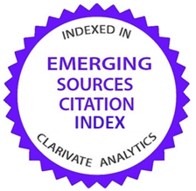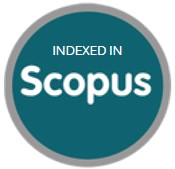Una aproximación psicosocial a las causas de los fallos de inteligencia
DOI:
https://doi.org/10.21830/19006586.977Palabras clave:
fallo de inteligencia, inteligencia, psicología social, seguridad, teoría de los accidentes normalesResumen
Este artículo aborda el concepto de fallo de inteligencia, sus rasgos y sus principales causas a partir de una perspectiva psicosocial. Desde este punto de vista, se plantea que los errores son inherentes a toda actividad humana y a la naturaleza de la inteligencia, de modo que su ocurrencia es normal e inevitable en sistemas complejos, como lo son los servicios, las agencias y las comunidades de inteligencia. Con todo, se argumenta que, si bien no se pueden evitar, es posible minimizar al máximo su ocurrencia y mitigar el impacto negativo que podrían tener. En ese sentido, se plantean algunas medidas y acciones que pueden contribuir a ese fin.
Descargas
Referencias bibliográficas
Berkowitz, B. (2001). Better ways to fix U.S. intelligence. Orbis, 45(4), 609-619. http://dx.doi.org/10.1016/S0030-4387(01)00099-0
Berkowitz, B. (2003, 2 de febrero). The big difference between intelligence and evidence. The Washington Post. https://bit.ly/3xKMzL7
Berkowitz, B., & Goodman, A. (2000). Best truth: Intelligence in the information age. Yale University Press.
Betts, R. (1978). Analysis, war and decision: Why intelligence failures are inevitable. World Politics, 31(1), 61-89. http://dx.doi.org/10.2307/2009967
Betts, R. (2002). Fixing intelligence. Foreign Affairs, 81(1), 43-59. http://dx.doi.org/10.2307/20033002
Betts, R. (2007). Enemies of intelligence. Knowledge and power in American national security. Columbia University Press.
Brady, C. (1993). Intelligence failures: Plus ça change. Intelligence and National Security, 4(8), 86-96. https://doi.org/10.1080/02684529308432227
Corera, G. (2004, 9 de julio). CIA shoulders the blame. BBC News. https://bbc.in/3S5u1xm
Cremades-Guisado, A., & Cancelado-Franco, H. (2021). La inteligencia como organización burocrática: disfunciones del modelo weberiano. Revista Científica General José María Córdova, 19(34), 479-496. https://doi.org/10.21830/19006586.701
Díaz Fernández, A. M. (2006). El papel de la comunidad de inteligencia en la toma de decisiones de la política exterior y de seguridad de España (Documento de Trabajo n.º 3). Observatorio de Política Exterior Española, Fundación Alternativas. https://bit.ly/3S8tN8q
Díaz Fernández, A. M. (Coord.) (2013). Diccionario LID Inteligencia y Seguridad. LID Editorial Empresarial; Presidencia del Gobierno de España.
Díaz Matey, G. (2005) Methodological approaches to the concept of intelligence failure. UNISCI Discussion Papers, 7. https://bit.ly/3SpvD4O
Díaz Matey, G. (2017), La esencia de la inteligencia: hacia una correcta relación entre producción y consumo de inteligencia (Documento de Opinión n.º 52). Instituto Español de Estudios Estratégicos. https://bit.ly/3r0nOqt
Duffy, M. (2003, 27 de julio). Could it happen again? Time. https://bit.ly/3BET2bJ
Esteban N., M., & Navarro B., D. (2003). Gestión del conocimiento y servicios de inteligencia: la dimensión estratégica de la información. El Profesional de la Información, 12(4), 269-281. https://bit.ly/3qYZTrx
George, R. (2004). Fixing the problem of analytical mind-sets: alternative analysis. International Journal of Intelligence and Counterintelligence, 17(3), 385-404. http://dx.doi.org/10.1080/08850600490446727
Handel, M. I. (1977). The Yom Kippur War and the inevitability of surprise. International Studies Quarterly, 21(3), 461-502. https://doi.org/10.2307/2600234
Handel, M. I. (1984). Intelligence and the problem of strategic surprise. Journal of Strategic Studies, 7(3), 229-281. https://doi.org/10.1080/01402398408437190
Hedley, J. (2005). Learning from intelligence failures. International Journal of Intelligence and CounterIntelligence, 18(3), 435-450. https://doi.org/10.1080/08850600590945416
Herman, M. (1996). Intelligence power in peace and war. Cambridge University Press.
Heuer, R. (1999). Psychology of intelligence analysis. Central Intelligence Agency.
Heuer, R. (2005). Limits of intelligence analysis. Orbis, 49(1), 75-94. https://doi.org/10.1016/j.orbis.2004.10.007
Heuer, R. (2008). Small group processes for intelligence analysis. Central Intelligence Agency; Sherman Kent School.
Heuer, R., & Pherson, R. (2011). Structured analytic techniques for intelligence analysis. CQ Press.
Hulnick, A. (2002). The downside of open source intelligence. International Journal of Intelligence and Counterintelligence, 15(4), 565-579. https://doi.org/10.1080/08850600290101767
Johnson, L. (2006). A framework for strengthening U.S. intelligence. Yale Journal of International Affairs, 1(2), 116-131. https://bit.ly/3Siqv2i
Kent, S. (1964). A crucial estimate relived. Studies in Intelligence, 8(4), 1-18. https://bit.ly/3SiqBqG
Kuhns, W. J. (2003). Intelligence failures: Forecasting and the lessons of epistemology. En R. Betts & T. Mahnken (Eds.), Paradoxes of strategic intelligence: Essays in honor of Michael I. Handel (pp. 77-96). Routledge. https://doi.org/10.4324/9780203508640
Laqueur, W. (1985). A world of secrets: Uses & limits of intelligence. Basic Books.
Laqueur, W. (2003). La guerra sin fin: el terrorismo en el siglo XXI. Destino.
Laqueur, W. (2004, 15 de junio). Las desgracias de la CIA. La Vanguardia. https://bit.ly/3BBiuih
Lefebvre, S. (2004). A look at intelligence analysis. International Journal of Intelligence and Counterintelligence, 17(2), 231-264. https://doi.org/10.1080/08850600490274908
Lowenthal, M. (1985). The burdensome concept of failure. En A. C. Maurer, M. Tunstall, & J. Keagle (Eds.), Intelligence: Policy and process (pp. 43-56). Westview Press.
Lowenthal, M. (1993). Intelligence epistemology: Dealing with the unbelievable. International Journal of Intelligence and Counterintelligence, 6(3), 319-325. https://doi.org/10.1080/08850609308435222
Lowenthal, M. (2000). Intelligence: From secrets to policy. Congressional Quarterly Press.
Marrin, S. (2003). CIA’s Kent School: Improving training for new analysts. International Journal of Intelligence and CounterIntelligence, 16(4), 609-637. https://doi.org/10.1080/716100469
Marrin, S. (2004). Preventing intelligence failures by learning from the past. International Journal of Intelligence and CounterIntelligence, 17(4), 655-672. https://doi.org/10.1080/08850600490496452
Martínez-Sánchez, J. A. (2014). Psicología e Inteligencia: factores psicológicos que condicionan el análisis de inteligencia. En F. Velasco, y R. Arcos (Eds.), Estudios en inteligencia: respuestas para la Gobernanza democrática (pp. 181-202). Plaza y Valdés.
Martínez-Sánchez, J. A. (2016). Fallo de Inteligencia. En A. M. Díaz Fernández (Dir.), Conceptos fundamentales de inteligencia (pp. 183-190). Tirant lo Blanch.
Martínez-Sánchez, J. A., & Rodríguez G., J. M. (2019). Patologías organizacionales y fallos de inteligencia (Análisis GESI, 10). https://bit.ly/3DOVuPt
Montero, A. (2004). Psicología del terrorismo e inteligencia contraterrorista. Papeles del Psicólogo, 25(88), 39-47. http://www.papelesdelpsicologo.es/resumen?pii=1158
Navarro B., D. (2004). Introducción. Cuadernos de Estrategia, 127, 7-31. Instituto Español de Estudios Estratégicos.
O’Connor, T. (2012). The history and lessons of intelligence failure. Austin Peay State University. https://bit.ly/3LAdqze
Perrow, C. (1984). Normal accident: Living with high-risk technology. Basic Books.
Poteat, G. H. (1976).The intelligence gap: Hypotheses on the process of surprise. International Studies Notes, 3(3), 14-18. https://www.jstor.org/stable/44235762
Random, R. A. (1958). Intelligence as a science. Studies in Intelligence, 2(2), 75-79. https://bit.ly/3BI1cQi
Reynolds, P. (2004, 11 de julio). Long history of intelligence failures. BBC News. https://bbc.in/3LFUmje
Russell, R. L. (2004). Intelligence failures: The wrong model for the war on terror. Policy Review, 123, 61-72.
Shulsky, A, & Schmitt, G. (2002). Silent warfare: Understanding the world of intelligence (3rd ed.). Potomac Books Inc.
Steele, R. (2002, 11 de marzo). The new craft of intelligence: Making the most of open private sector knowledge. Time Magazine. https://bit.ly/3C3ER13
Stempel, J. (1999). Error, folly, and policy intelligence. International Journal of Intelligence and CounterIntelligence, 12(3), 267-281. https://doi.org/10.1080/088506099305034
Taleb, N. (2007). The black swan: The impact of the highly improbable. Random House.
Travers, R. (1997). A blueprint for survival: The coming intelligence failure. Studies in Intelligence, 40(5), 35-43. https://bit.ly/3BHvq64
Treverton, G. (2001). Reshaping national intelligence for an age of information. Cambridge University Press.
United States Senate Select Committee on Intelligence (2004, 9 de julio). Report of the Select Committee on Intelligence on the intelligence community’s prewar intelligence assessments on Iraq (S. Report n.º 108-301). U.S. Government Printing Office.
Westerfield, H. B. (1996). Inside ivory bunkers: CIA analysts resist manager’s “pandering”. Part I. International Journal of Intelligence and Counterintelligence, 9(4), 407-424. https://doi.org/10.1080/08850609608435325
Whaley, B. (1973). Code Word Barbarrosa. The MIT Press.
Wohlstetter, R. (1962). Pearl Harbor: Warning and decision. Stanford University Press.
Descargas
Publicado
Cómo citar
Número
Sección
Licencia
Derechos de autor 2022 Revista Científica General José María Córdova

Esta obra está bajo una licencia internacional Creative Commons Atribución-NoComercial-SinDerivadas 4.0.

| Estadísticas de artículo | |
|---|---|
| Vistas de resúmenes | |
| Vistas de PDF | |
| Descargas de PDF | |
| Vistas de HTML | |
| Otras vistas | |
























